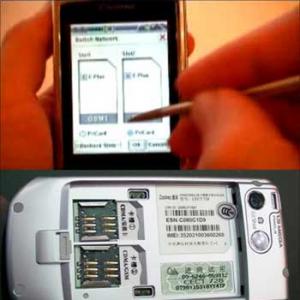 After the telecom services players, it's the handset manufacturers' turn to eye the growing Rs 50,000 crore (Rs 500 billion) handset market in India.
After the telecom services players, it's the handset manufacturers' turn to eye the growing Rs 50,000 crore (Rs 500 billion) handset market in India.
The segment has witnessed the entry of at least one new mobile vendor every month, taking the total number of handset manufacturers to about 30 from a mere five in 2008.
These new home grown entrants are giving tough competition to well entrenched players -- Nokia, Samsung and Sony Ericsson -- in terms of price, features, models and services.
For the year 2009, new vendors registered a combined market share of 12.3 per cent of the total 101.54 million mobile handset sales. In fact, the number of such new vendors in the India mobile handsets market grew to 28 notes Naveen Mishra, lead analyst, mobile handsets research, IDC India.
Take for instance the recent foray of Luminous -- a power and energy storage company -- into the mobile handset market under Wynn Telecom. Starting May this year, the company will launch seven dual SIM handsets priced under Rs 5,000 and will also get ready to manufacture handsets in India.
Add to this the company will also be investing over Rs 110 crore (Rs billion) this financial year and will focus on segments such as utility, upgrade and youth phones. "Today, even before we have launched, we have established a design facility in China comprising of 20 people. Soon, we will begin our domestic handset manufacturing unit too in order to reduce the time-to-market for the handsets," said Rakesh Malhotra, co-founder and chairman of Wynn Telecom.
Mishra of IDC further believes that new players will continue to flood the Indian mobile handset market. "The market will witness the launch of more look-alikes following the launch of aspirational value smartphone models by major vendors. The adoption of these look-alikes is expected to be higher amongst students and young executives, whose purchase decisions are often driven by peer group and lifestyle influences, as well as affordability," said Mishra.
As India inches towards 600 million subscriber base, Telecom Regulatory Authority of India (TRAI) has reported 53.37 million net additions in last quater ended December 2009, of which 31 per cent came from rural subscriptions.
Handset vendors like Arun Khanna, chairman of Olive Telecommunications, is relying on mobile devices tailored to suit rural demands to drive growth. Since the launch in December last year, Olive Telecom has introduced nine mobile handsets priced at Rs 999 and onwards, and intends to launch 30 more models this year. The company has launched Olive FrvrOn that can work on AAA battery and retails at Rs 1,699. "In case, the lithium-ion battery in the phone dies out, you can simply pop in any AAA battery from the market," says Khanna.
Olive, he adds, has invested in four R&D centres, which are currently involved in developing 3G compatible handsets along with a host of other products in the IT and telecom space. "We are also planning to invest $100 million (around Rs 445 crore (Rs billion)) in the new R&D centre in Delhi," Khanna claims.
Debuting with handsets targeted at the entry-level segment, Airfone aspires to become one of the top five handset companies in India. Vishal Chitkara, director, Airfone, began with 37 service centres and has grown these to 121 centres this month.
But that was the easy part, he admits, "We are now focussing on setting up an handset assembling unit in Tamil Nadu this year that will help us in managing device costs." Airfone is intent on positioning its devices for the price-concious subscriber.
Videocon Mobiles, with 21 models in market, has managed to keep its prices grounded between Rs 1,300 and Rs 19,000 but Anil Khera, CEO of Videocon Mobile, is aiming for the leadership position with touch-based and video phones.
After-sales service is one area where these new brands are keen to make a dent. Karbonn Mobiles has built an extensive network of more than 350 services centres spread across the country, where more than 150 are dedicated Karbonn mobile phone service centres.
The company aims to capture a market share of 7-10 per cent in India in the multimedia phone segment in the current fiscal. The company is aiming for revenues in excess of Rs 1,000 crore (Rs billion) from its operations in the current fiscal. It has already made an investment of $5 million (over Rs 20 crore (Rs billion)) for product development and its marketing & sales operations in India.
Despite so many players, many feel that there is enough room for everyone. Take the case of London-based INQ mobiles focused on the urban centres. Armed with three social-networking-based phones, it is eyeing just the youth market.
"We believe that if done right then we can cement our position in the crowded market. So, we began with handsets customised with a Cricinfo widget, Facebook and Orkut integration. With Aircel as the operator partner, we are doing good sales," claims Frank Meehan, CEO of INQ Mobiles.






